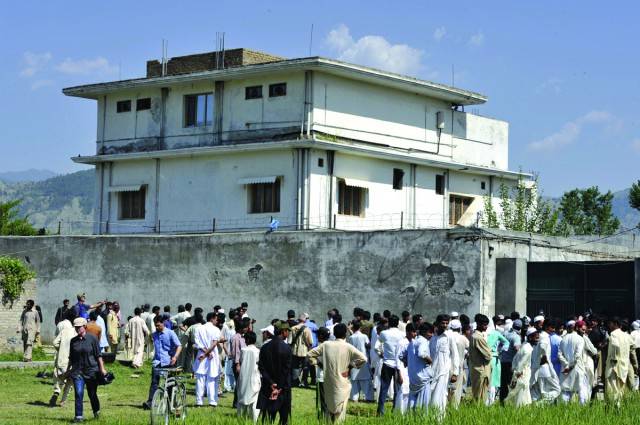
May 2 will mark the 10th anniversary of one of the most shameful and horrendous incidents in Pakistan’s history; the taking out of Osama Bin Laden by the US Navy Seals from his hideout near the military’s training academy in Abbottabad cantonment. A decade is long enough for the dust to settle and it is time to look back with a measure of objectivity and detachment. It is important to learn lessons.
Saudi national Osama Bin Laden had founded Al Qaeda which claimed responsibility for many terrorist attacks around the world, including the 9/11 attacks in the United States. Escaping a US attack on Tora Bora caves in Afghanistan in 2001, he fled and remained in hiding, eluding a high-tech global manhunt for no less than a decade.
During the pursuit, there were rumors that OBL was injured by shrapnel in Tora Bora, that he suffered from serious heart and kidney ailments and may have already died. In a January 2002 interview with CNN, General Pervez Musharraf said that Bin Laden had probably died of kidney failure and claimed that he had taken two dialysis machines into Afghanistan with him.
The rumors of his death were put to rest when video messages of OBL began appearing regularly vowing to continue jihad. It was at this time when Benazir Bhutto cryptically commented that Musharraf was “running with the hare and hunting with the hound.” The world also must have taken notice.
On May 2 it was President Obama, not Pakistan, who broke the news that OBL had been taken out. The operation itself lasted 40 minutes from start to finish but it must have taken several hours between when the US helicopters entered Pakistani airspace and then left it along with the dead body of Bin Laden. The daring operation was also filmed.
Neither the defenders in the army and Air Force nor any other law enforcement agency had any clue as to what had happened during those fateful hours in the wee hours of May 2.
Pakistan’s initial response was shock and bewilderment. Reiterating commitment to end militancy, it welcomed the taking out of OBL and expressed anger and frustration over violating Pakistan’s sovereignty as contained in an Op-Ed in Washington Post the very next day by President Zardari.
General Ashfaq Pervez Kiyani’s first public comment came a few days later. Describing the operation as ‘misadventure,’ he said that no further raids will be tolerated. The thrust seemed to be to warn India, without naming it, to not feel emboldened by it. The Air Force chief admitted to failure of air surveillance. The radars on the western borders were said to be inactive on the day. It was also given out that the US helicopters used radar evading stealth technology.
That 5/2 was a humiliating military debacle for Pakistan should not be in doubt. The army was caught between the rock and a hard place. It had all along forcefully denied that OBL was hiding in Pakistan. It clearly meant a shocking intelligence failure.

An admission now that OBL indeed was under its protection would have meant unpardonable failure in defending the country from a daring raid. Pakistan was thus forced to blame it on intelligence failure.
Apologists for the military, particularly some retired generals unable to swallow the humiliation, later tried to give a spin by claiming without evidence that a few top commanders were aware of the operation. Their capacity to delude themselves and the people is astounding.
A commission headed by retired Supreme Court judge Javed Iqbal was appointed to probe the incident. Other members included Abbas Khan, Ashraf Jehangir Qazi and retired Lt Gen Nadeem Ahmed. The commission submitted its report to the Prime Minister sometime in early 2013.
Findings of this report have not been made public but parts of it were leaked to foreign media. The report was said to be highly critical of ISI and the military leadership.
Later in July 2013, a member of the commission Ashraf Jehangir Qazi informed the Senate Committee on Defence that there were differences among members over fixing the responsibility. The report leaked to the media had subsequently been watered down by the chairman to ‘reconcile’ the difference, he said. Ashraf Jehangir Qazi wrote a 40-page note of dissent to the watered-down version to which chairman Justice Iqbal then added his own observations.
Instead of finding answers to some hard questions and learning from it, an organized campaign was launched to deflect focus of public discourse.
Questions were asked about Americans visiting Pakistan, who had issued them visas, on whose authority and for what purpose?
An impression was created that Ambassador Haqqani had issued visas at the instance of President Zardari to Americans. Civilians were blamed for allowing the CIA spies to sneak into Pakistan and blow the cover on OBL.
A doctor Shakil Afridi was arrested for running a vaccination campaign in Abbottabad that allegedly helped the CIA reach out to the OBL hideout. Interestingly, he was sentenced to 25 years in jail, not for helping CIA locate OBL, but for aiding a banned militant outfit ‘Lashkar Islam’ and that too under the now defunct FCR.
Another bogeyman called ‘Memogate’ was also crafted to blame civilians for conspiring with the US administration against the Pakistan Army. It was finally thrown out by the Supreme Court but not before the civilians had been painted black in public perception.
The OBL raid has exposed serious fault lines. Blame civilians even for misdeeds which cannot be laid at their doorstep, trivialize most shameful incidents and thereby miss opportunities for introspection and course correction. This indeed is the lesson of the OBL incident.
Mercifully everyone now talks of putting ‘own house in order’ and of ‘strategic change’ in policy. If we really mean it, we must begin by coming to terms with the OBL saga. We must expose and strip off the titles and medals of all those responsible for the debacle.
The writer is a former senator
Saudi national Osama Bin Laden had founded Al Qaeda which claimed responsibility for many terrorist attacks around the world, including the 9/11 attacks in the United States. Escaping a US attack on Tora Bora caves in Afghanistan in 2001, he fled and remained in hiding, eluding a high-tech global manhunt for no less than a decade.
During the pursuit, there were rumors that OBL was injured by shrapnel in Tora Bora, that he suffered from serious heart and kidney ailments and may have already died. In a January 2002 interview with CNN, General Pervez Musharraf said that Bin Laden had probably died of kidney failure and claimed that he had taken two dialysis machines into Afghanistan with him.
The rumors of his death were put to rest when video messages of OBL began appearing regularly vowing to continue jihad. It was at this time when Benazir Bhutto cryptically commented that Musharraf was “running with the hare and hunting with the hound.” The world also must have taken notice.
On May 2 it was President Obama, not Pakistan, who broke the news that OBL had been taken out. The operation itself lasted 40 minutes from start to finish but it must have taken several hours between when the US helicopters entered Pakistani airspace and then left it along with the dead body of Bin Laden. The daring operation was also filmed.
Neither the defenders in the army and Air Force nor any other law enforcement agency had any clue as to what had happened during those fateful hours in the wee hours of May 2.
Pakistan’s initial response was shock and bewilderment. Reiterating commitment to end militancy, it welcomed the taking out of OBL and expressed anger and frustration over violating Pakistan’s sovereignty as contained in an Op-Ed in Washington Post the very next day by President Zardari.
An impression was created that Ambassador Haqqani had issued visas at the instance of President Zardari to Americans. Civilians were blamed for allowing the CIA spies to sneak in
General Ashfaq Pervez Kiyani’s first public comment came a few days later. Describing the operation as ‘misadventure,’ he said that no further raids will be tolerated. The thrust seemed to be to warn India, without naming it, to not feel emboldened by it. The Air Force chief admitted to failure of air surveillance. The radars on the western borders were said to be inactive on the day. It was also given out that the US helicopters used radar evading stealth technology.
That 5/2 was a humiliating military debacle for Pakistan should not be in doubt. The army was caught between the rock and a hard place. It had all along forcefully denied that OBL was hiding in Pakistan. It clearly meant a shocking intelligence failure.

An admission now that OBL indeed was under its protection would have meant unpardonable failure in defending the country from a daring raid. Pakistan was thus forced to blame it on intelligence failure.
Apologists for the military, particularly some retired generals unable to swallow the humiliation, later tried to give a spin by claiming without evidence that a few top commanders were aware of the operation. Their capacity to delude themselves and the people is astounding.
A commission headed by retired Supreme Court judge Javed Iqbal was appointed to probe the incident. Other members included Abbas Khan, Ashraf Jehangir Qazi and retired Lt Gen Nadeem Ahmed. The commission submitted its report to the Prime Minister sometime in early 2013.
Findings of this report have not been made public but parts of it were leaked to foreign media. The report was said to be highly critical of ISI and the military leadership.
Later in July 2013, a member of the commission Ashraf Jehangir Qazi informed the Senate Committee on Defence that there were differences among members over fixing the responsibility. The report leaked to the media had subsequently been watered down by the chairman to ‘reconcile’ the difference, he said. Ashraf Jehangir Qazi wrote a 40-page note of dissent to the watered-down version to which chairman Justice Iqbal then added his own observations.
Instead of finding answers to some hard questions and learning from it, an organized campaign was launched to deflect focus of public discourse.
Questions were asked about Americans visiting Pakistan, who had issued them visas, on whose authority and for what purpose?
An impression was created that Ambassador Haqqani had issued visas at the instance of President Zardari to Americans. Civilians were blamed for allowing the CIA spies to sneak into Pakistan and blow the cover on OBL.
A doctor Shakil Afridi was arrested for running a vaccination campaign in Abbottabad that allegedly helped the CIA reach out to the OBL hideout. Interestingly, he was sentenced to 25 years in jail, not for helping CIA locate OBL, but for aiding a banned militant outfit ‘Lashkar Islam’ and that too under the now defunct FCR.
Another bogeyman called ‘Memogate’ was also crafted to blame civilians for conspiring with the US administration against the Pakistan Army. It was finally thrown out by the Supreme Court but not before the civilians had been painted black in public perception.
The OBL raid has exposed serious fault lines. Blame civilians even for misdeeds which cannot be laid at their doorstep, trivialize most shameful incidents and thereby miss opportunities for introspection and course correction. This indeed is the lesson of the OBL incident.
Mercifully everyone now talks of putting ‘own house in order’ and of ‘strategic change’ in policy. If we really mean it, we must begin by coming to terms with the OBL saga. We must expose and strip off the titles and medals of all those responsible for the debacle.
The writer is a former senator

